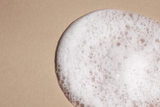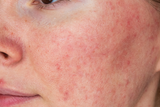Easy Peasy You
Is facial oil good or bad? 15 benefits of facial oils put to the test
Posted by Lara Schimweg on
Facial oils are all the rage. They're touted for their many benefits: they're said to moisturize, replace creams, serums, and cleansers. Some even claim that oils have a natural sun protection factor. What's the truth behind these myths? Spoiler alert: some of it is true, but much of it isn't.
Some people fear that oils are even bad for the skin. Is there any truth to that?
Many supposed benefits of facial oils are actually misconceptions.
To benefit from all the advantages of facial oils, it is important to select and combine the right oils.
Pure, unprocessed plant oils even have some disadvantages for the skin.
Contents
Why is facial oil good?
We hear the following advantages time and again when the topic of facial oil comes up. We'll go through them one by one and question whether each advantage is truly an advantage.
Does oil provide moisture?
It's often said that pure oils are ideal for the skin because they provide so much moisture. However, this isn't true. Moisture means water combined with moisturizing ingredients like glycerin, hyaluronic acid, PCA, sugar, etc. Oils, however, consist only of fats. So how can an oil provide moisture?
But how did the claim arise that pure facial oils are so moisturizing?
This is a slight misunderstanding. Some oils can actually lock in moisture and slow down moisture loss in the skin. The layer of oil prevents the skin from losing even more moisture, provided you choose the right oil.
However, one thing you should keep in mind with all pure facial oils is their drying effect if used incorrectly. You heard right. Pure oils can dry out your skin if you apply them to dry skin. The lack of a moisturizing effect is precisely the problem here. Oils act like a cleanser and wash away the natural oils from your skin when applied to dry skin. This would lead to even more moisture loss. Therefore, pure facial oils should always be applied to damp skin. Water is the minimum, but not ideal. It's best to apply a moisturizing skincare product, such as a cream or serum, before applying an oil.
With serum (e.g. our serum spray ) and oil, you can get close to a cream in 2 steps.
But doesn't oil at least prevent moisture loss?
That's partly true. Unfortunately, not every pure oil can retain moisture in your skin. Light oils rich in linoleic acid or jojoba oil, for example, can't retain enough moisture. These oils are useful if you want to supply your skin with specific fatty acids. Pure olive oil can even cause your skin to lose more moisture.
Conventional cosmetics often use mineral oils to retain moisture in the skin. Mineral oils are extremely effective at retaining moisture. Cold creams and petroleum jelly for dry skin are prime examples. Unfortunately, mineral oil is harmful to the environment and is not always suitable for sensitive skin. Mineral oil is a trigger for rosacea . Silicones can be used for combination skin. However, these have little to do with the skin's structure but are generally better tolerated than mineral oil. People with rosacea , however, often cannot tolerate silicones or can only tolerate them in small amounts.
Natural cosmetics use unprocessed plant oils and rich plant butters to retain moisture in the skin. These are not as effective as mineral oil or silicone. Therefore, natural cosmetics often use a lot of fat. Unfortunately, not all skin tolerates unprocessed plant oils and fats because skin is not structured like a plant. You should keep this in mind when switching to natural cosmetics . Unprocessed plant oils can also feed acne bacteria and are among the triggers for rosacea.
Squalane is almost as effective as mineral oil when it comes to moisturizing properties. It can be derived from olive oil or sugar cane, making it an ideal substitute for plant oils and butters in natural cosmetics. Furthermore, squalane occurs naturally in your skin in a similar form, squalene, and thus integrates seamlessly into your skin layers. Since the amount of squalene in the skin decreases with age, skincare products containing squalane are beneficial for compensating for this loss.
It is a very well-tolerated oil, suitable even for people with sensitive skin, acne, or Rosacea can use it. That's why we use squalane in our creams and in our Human Glow facial oil .
Can oil replace a cream?
No, a pure plant oil cannot replace a cream because, as described above, it doesn't provide moisture. You would need to combine an oil with a serum or another moisturizing product to get close to the effect of a cream. Even with pure squalane, you won't get the necessary moisture.
Suggestion:
Bright Head – serum spray for hydration and squalane or Human Glow to lock in moisture.
Can oils make a cream richer?
There are several plant oils that can instantly enrich your cream. A few drops added to or sprinkled over the cream are usually all it takes. Depending on your skin type and current condition, different oils may be beneficial as an addition.
Dry skin types benefit from oils rich in oleic acid. For dry skin that isn't prone to breakouts, plant oils can be a good addition. However, oleic acid can further weaken a weak skin barrier. So, be careful with sensitive skin, especially if you have eczema, rosacea, or psoriasis. If you're using active ingredients, oleic acid can help these substances penetrate deeper into the skin. This can be an advantage, but also a disadvantage for sensitive skin. You'll find a high percentage of oleic acid in organic marula oil, almond oil, or avocado oil, for example. However, the percentage can vary significantly depending on the harvest. Tip: If you have dry skin, you could use a few drops once a week to avoid applying too much oleic acid to your skin.
If your skin is prone to breakouts or you have concerns about unprocessed plant oils, then squalane could be the oil for you. Squalane, derived from olive oil or sugar cane, is an oil that is suitable for all skin types.
Facial oils provide the skin with vitamins and antioxidants.
You can introduce antioxidants into your skin using different plant oils. Unprocessed oils contain many of these, depending on the type. These combat free radicals and skin stressors that your skin is exposed to daily. Seed or kernel oils are best.
Can oil replace an active ingredient serum?
There are two answers here, depending on the product:
1. Pure plant oils , as described above, usually contain natural vitamins C, E, or A. However, you can't compare their effects to a serum enriched with vitamins. For example, the vitamin C content in marula oil is much lower than in a vitamin C serum . Furthermore, the vitamin C is not as stable as in a serum. Another example is rosehip seed oil, which is often marketed as a natural retinol. However, the natural vitamin A content in rosehip seed oil is far too low to protect you from skin aging to the same extent as a retinol serum would.
While pure plant oils can provide your skin with natural vitamins and antioxidants, don't expect them to work like vitamin serums. Marula oil, for example, is unlikely to lighten age spots, and you probably don't need retinol. Pure plant oils are best seen as a supplement. With their natural vitamins and antioxidants, they act like a protective shield against environmental stressors. Your skin can benefit from the various fatty acids, provided you choose the right oil, apply it correctly, and your skin tolerates unprocessed plant oils. Otherwise, your skin could become unnecessarily dry or irritated.
2. Oil blends: It makes perfect sense to dissolve certain vitamins in pure oils, as this allows for better absorption by the skin. Some vitamins are intentionally dissolved in oils to improve their tolerability. Such an oil serum with added active ingredients can be just as effective as a water-based serum . Of course, this also depends on the active ingredients. Some active ingredients are water-soluble and therefore cannot be used in a purely oil-based product.
Tip: Active ingredients dissolved in oil are milder than those dissolved in water. Therefore, oil serums can be a good idea for sensitive skin.
Is oil cleaning the gentlest form of cleaning?
This is a widespread opinion. This statement is too simplistic and generalized. It's true that pure plant oils are excellent at dissolving dirt, grease, and makeup. This works on the principle of "like dissolves like," meaning oil dissolves grease and everything dissolved in it. However, a pure plant oil is not ideal for gentle facial cleansing . The so-called "oil cleansing method" can lead to pimples, blemishes, and in the worst case, acne. Pure oil cannot be washed off the skin with water. Therefore, a layer of oil mixed with dirt and makeup would remain after every cleansing. This would be the perfect breeding ground for acne bacteria to multiply.
Ready-made oil cleansers are significantly more effective. In theory, they work similarly to pure oil, but they also contain emulsifiers. These ensure that you can completely wash the oil off your skin, leaving no greasy residue. This type of cleansing is gentle. However, it's not necessarily the best option for every skin type. Some skin types react sensitively to oil cleansers containing unprocessed plant oils.
Sugar surfactants and neutral fats offer an equally gentle, if not even gentler, way to cleanse the skin. Neutral fats dissolve makeup, dirt, and sunscreen. They don't feed acne bacteria. Similar to the emulsifiers in oil-based cleansers, the mild sugar surfactants allow you to easily wash everything off.
Don't get me wrong: Every cleansing process is a minor intervention in your skin's natural function. Makeup, sunscreen, and the like unfortunately can't be washed off with water alone. That's why a gentle daily cleansing routine in the evening is so important. However, pure plant oils are just as unsuitable as harsh cleansers containing harsh waxes, such as sodium laureth sulfate (SLS).
Here you'll find our gentle facial cleanser for very sensitive skin . Game Changer combines oil cleansing with a very mild surfactant cleanser using sugar surfactants. This creates a "moisturizing effect," ensuring your skin retains just the right amount of natural oils. As a result, you'll need less moisturizer.
- Tags: Glow, Hautpflege, Inhaltsstoffe, Naturkosmetik, Oel, Pickel, Rosazea
← Older Post Newer Post →
0 comments







